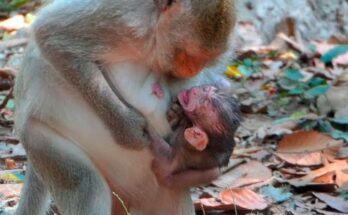The relationship between a mother and her infant is a cornerstone of survival and development in many species, including gibbons. Among these highly intelligent and agile primates, a good mother provides her baby with warmth, protection, and care, which are crucial for the baby’s physical and emotional well-being. The warmth a mother gibbon gives to her baby goes beyond the literal sense of body heat; it represents nurturing, emotional connection, and the foundation of the baby’s survival in a challenging natural environment.
Gibbons, known for their incredible arboreal skills and melodic songs, are small apes found in Southeast Asia’s tropical rainforests. They are highly social animals, often living in tight-knit family groups. For these primates, the bond between a mother and her offspring begins even before birth. During pregnancy, the mother invests significant energy in nourishing her developing baby, ensuring that it enters the world healthy and robust.
Once the baby gibbon is born, the mother’s warmth becomes a lifeline. Physically, the infant gibbon is highly dependent on its mother. Newborns are born without the ability to regulate their body temperature efficiently, making the warmth of their mother’s body essential for maintaining a stable temperature. The mother holds her baby close, often cradling it against her chest. This constant physical contact not only provides the necessary warmth but also fosters a sense of security and trust between the two.
The warmth of a mother gibbon extends beyond physical proximity. It includes her attentive and protective behavior, which ensures the baby’s safety in the dense and often perilous canopy of the rainforest. Gibbons are highly territorial, and a mother must navigate the demands of foraging, avoiding predators, and maintaining her baby’s safety. She does this with remarkable dedication, often limiting her movements and prioritizing her infant’s needs over her own. Her ability to provide consistent care allows the baby to grow strong and learn essential survival skills.
A good mother also offers emotional warmth through her interactions with her baby. Gibbons are highly intelligent, and social bonds are integral to their development. Through gentle grooming, vocal communication, and playful interactions, the mother fosters a deep emotional connection with her offspring. These interactions not only reassure the baby but also play a critical role in teaching it about its environment, social structures, and communication within its group.
The bond between a mother gibbon and her baby also has long-term effects on the young one’s development. A mother’s warmth and care help shape the infant’s social and emotional capabilities. Gibbons raised in secure and nurturing environments are more likely to grow into confident and socially adept adults. They learn the songs that are unique to their family, master the acrobatic skills needed for navigating the treetops, and develop the ability to form their own bonds in adulthood.
In conclusion, the warmth of a good mother is the cornerstone of a baby gibbon’s survival and development. This warmth is multifaceted, encompassing physical care, emotional support, and protection. Through her unwavering dedication, the mother ensures that her offspring is not only nurtured but also equipped with the tools needed to thrive in the wild. The bond between a mother and her baby gibbon is a poignant reminder of the universal importance of love, care, and connection in the natural world.


